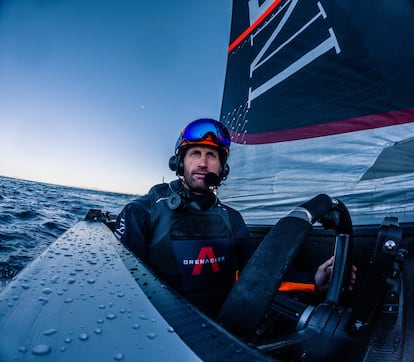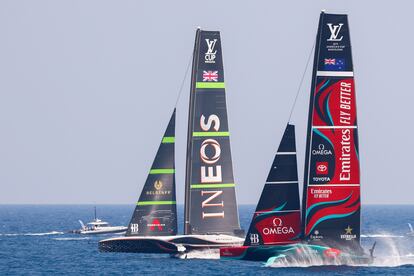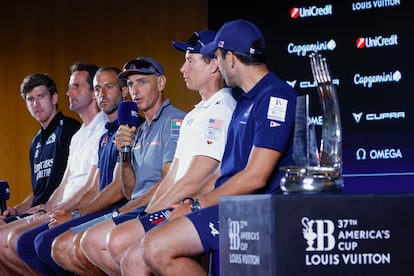Ben Ainslie, skipper of INEOS Britannia: ‘I’ve lost too many friends to the sea. I have a very healthy respect for it’
One of the greatest sailors in history is looking to finally bring the America’s Cup to the United Kingdom and complete a unique list of achievements

Ben Ainslie is a master and commander. At 47, he is the only skipper in the America’s Cup sailing competition in Barcelona who combines his role as team principal with that of skipper. He leads INEOS Britannia in the office and in the AC75 as a helmsman, the umpteenth exception of this unusual sportsman. Winner of four consecutive Olympic golds between 2000 and 2012 and a silver at Atlanta 1996; eight-time world champion and 2013 America’s Cup winner with Oracle Team USA, Ainslie has made victory routine. There is, however, one frustration that has grown over the years. “I wish we’d have won the America’s Cup for Britain by now,” he says. “But we’ll get there.”
After the creation a decade ago of the parent project of today’s INEOS Britannia, the squadron is aiming to overhaul the all-powerful Team New Zealand, the defending champions, to further enhance the myth of Sir Ben, a Commander of the Order of the British Empire since 2009 for his sporting achievements and an undisputed icon of the sailing world.
Question: How does an athlete stay at the top of his game for so long?
Answer. Trying to stay at the top is always very hard because you’re then a target. And you have to constantly keep pushing new boundaries. I think it’s determination to want to achieve great things, to keep performing at the highest level. And like I said, to keep setting new targets for yourself. That’s really how you can derive the performance to try and stay ahead of the rest.
Q. What can a victory be compared to?
A. It’s very interesting, the feeling of winning as an individual sports person. I was fortunate to do that in the Olympic Games and of course it’s very satisfying from a personal perspective. But I’ve been fortunate to win the America’s Cup with Oracle in 2013, and that feeling of winning with a really strong team is much more rewarding than as an individual. That team element is very powerful.
Q. When will your desire to win be satisfied?
A. I don’t think it will ever be. We’re all cut from a different cloth. I’m obviously really a determined, competitive person. And at the moment it’s sailing, but maybe in the future it’ll be business or some other challenge. And of course you want to try and do it successfully.
Q. Do you currently consider yourself a sailor, a businessman or a principal?
A. It’s an interesting question. I’m a sailor at heart, but I figured out the reason why in my professional career, on the back of Olympic sailing, it wasn’t enough to just expect to be able to do the America’s Cup, or sail GP, or other professional parts of the sport. You had to go out and make it happen. You had to go out and sell the sport, sell the team. That’s really what drove me in the end to more of a management role as well as a sailing role. It’s a challenge, but at the same time, arguably we wouldn’t have a British team if I wasn’t managing it and pushing it.
Q. Would winning the America’s Cup for the United Kingdom close a cycle?
A. The thing about America’s Cup, if you win it, you’ve definitely got to keep going because you have to host the next one. So that would be a nice problem to have, but ultimately we need to win it first, and that’s our focus. Hopefully we can do it this time. If we don’t, we’ll keep trying. We need to win it.
Q. Looking back, do you consider yourself a child prodigy?
A. Again, good question. I was very talented as a youngster, but I wouldn’t say I was a child prodigy. It wasn’t like I was winning everything. I wasn’t a Mozart, let’s put it that way. But what I did have was a lot of focus and determination. I think when you look at any walk of life there’s a lot of very talented people, and the difference between the people that really go a long way is hard work, putting the effort in. Talent’s only going to take you so far.
Q. Have you ever been afraid of the sea?
A. Sometimes you feel the fear of being on the sea. I have a very healthy respect for the sea. Unfortunately, I’ve lost too many friends to the sea, so I’m very well aware of that.

Q. What are the dangers of the sea?
A. Well, something can go wrong. I’ve lost friends in ocean racing. I’ve lost friends in America’s Cup. In offshore racing, you’re out in the elements, you’re a long way away from shore. If something goes wrong, if there’s a storm, it’s very dangerous in America’s Cup. We’re pushing these boats to the limit, technically and structurally. And if something goes wrong there, we’ve seen that can be catastrophic. So that’s a risk.
Q. As you get older, do you take fewer risks?
A. I think I’m more experienced, so I’m better at figuring out that risk reward. But in a competitive element, you have to push hard. And if you’re not pushing hard, you’re probably not going to win. So that’s the trade-off you’ve got to find.
Q. What have you sacrificed for your career?
A. Family life. I’m very fortunate to have a wonderful wife and two beautiful kids. But I don’t spend anywhere near as much time with them as I should or I want to. So that’s the sacrifice.
Q. Do you have any regrets about your career?
A. No, I don’t regret anything. I think I’ve been really, really fortunate to have the opportunities. I wish we’d have won the America’s Cup for Britain by now. That’s the one thing that is a frustration for me, but we’ll get there.
Q. As the Challenger of Record this year, do you feel that INEOS is a cut above the other teams?
A. No, absolutely not. If you look at the history of the teams, it’s the two teams that have been in this game the longest that are performing the best: Team New Zealand and Luna Rossa. And it’s the same going into this competition. If you had to say, right now, who are the two favorites? It’s Team New Zealand and Luna Rossa again. I think ourselves and American Magic are close behind. Alinghi Red Bull — who obviously won the Cup twice but have been away for quite some time — and the French team have a lot of talent; they could surprise a lot of people.

Q. What will mark the difference in the races?
A. The performance of the boat, of course, is really critical. But we know here in Barcelona that the conditions will be very changeable, and you’re going to see certain teams better in certain conditions. And Mother Nature is going to have a say on that [laughs], but that’s part of the challenge.
Q. Xabi Fernández [Olympic medallist and coach of the British team] says that this will be the closest America’s Cup.
A. Yeah, I think so. The New Zealand team is still very competitive right now going into this competition. You would say they are performing the best, but there’s a long way to go. We’ve still got six weeks of racing ahead of us, but a lot’s going to change.
Q. How will your relationship with the Mercedes Formula 1 team influence your performance?
A. It’s an amazing opportunity. They have brought us innovative resources in fluid dynamics, for example, and in other areas. But the beauty of it all is to optimize the resources of a much larger organization without slowing down our progression, which can happen easily.
Q. Do you feel nervous before competing?
A. You’re always anxious for the race. I’m as anxious now as I was when I was a 19-year-old going to my first Olympic Games, because I think if there isn’t any anxiety, then you don’t care enough. And if you’re at a point where you’re not that bothered about it, then I don’t think you’re going to be as focused as you should be. A little bit of anxiety is good because it really sharpens the focus. And that’s where I’m at now, that’s where the team is at, we’re really pushing hard.
Sign up for our weekly newsletter to get more English-language news coverage from EL PAÍS USA Edition
Tu suscripción se está usando en otro dispositivo
¿Quieres añadir otro usuario a tu suscripción?
Si continúas leyendo en este dispositivo, no se podrá leer en el otro.
FlechaTu suscripción se está usando en otro dispositivo y solo puedes acceder a EL PAÍS desde un dispositivo a la vez.
Si quieres compartir tu cuenta, cambia tu suscripción a la modalidad Premium, así podrás añadir otro usuario. Cada uno accederá con su propia cuenta de email, lo que os permitirá personalizar vuestra experiencia en EL PAÍS.
¿Tienes una suscripción de empresa? Accede aquí para contratar más cuentas.
En el caso de no saber quién está usando tu cuenta, te recomendamos cambiar tu contraseña aquí.
Si decides continuar compartiendo tu cuenta, este mensaje se mostrará en tu dispositivo y en el de la otra persona que está usando tu cuenta de forma indefinida, afectando a tu experiencia de lectura. Puedes consultar aquí los términos y condiciones de la suscripción digital.









































